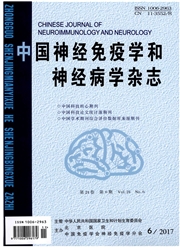

 中文摘要:
中文摘要:
阿尔茨海默病是常见的老年性中枢神经系统变性疾病,以进行性认知功能障碍,特别是空间学习记忆能力障碍为主要临床特征。AD的病因和发病机制非常复杂,以Aβ淀粉样蛋白聚集形成老年斑和tau蛋白异常磷酸化形成的神经元纤维缠结为主要病理特征。目前临床上尚无有效治疗手段。研究发现,在AD患者的脑中,与神经元丧失相比突触数量减少更明显,突触数量与患者认知功能的损害程度密切相关。促进神经再生药物可使AD患者已受损或坏死的海马区脑神经细胞能够再生,延缓AD的发展。因此通过神经再生促进药对AD进行治疗的前景令人向往。本文综述了神经再生与AD的关系和ROCK抑制剂对AD神经保护作用。
 英文摘要:
英文摘要:
Alzheimer's disease is a progressive degenerative disease of the central nervous system, which is mainly manifested by the impairment of memory and cognition. The etiology and pathogenesis of the complex, with A amyloid protein aggregation and tau protein abnormal phosphorylation of the formation of neuronal fiber entanglement as the main pathological characteristics. There is no effective treatment method for the target. The study found that in the brain of patients with AD, compared with the loss of neurons in the number of synapses is more obvious, the number of synapses and the degree of impairment of cognitive function in patients with the degree of impairment is closely related to. At the same time we are also pleased to find that the promotion of nerve regeneration drugs can make the AD patients have been damaged or necrotic hippocampal neuronal cells can be regenerated, delaying the development of AD. Therefore, the prospects for the treatment of AD through nerve regeneration is undoubtedly desirable, this article on the pathogene- sis of AD related immune inflammatory response to do a review.
 同期刊论文项目
同期刊论文项目
 同项目期刊论文
同项目期刊论文
 期刊信息
期刊信息
